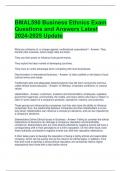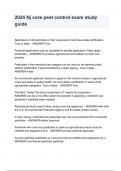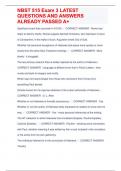BMAL590 Business Ethnics Exam
Questions and Answers Latest
2024-2025 Update
What are criticisms of, or charge against, multinational corporations? - Answer- They
transfer jobs overseas, where wage rates are lower.
They use their power to influence host governments.
They exploit the labor market of developing countries.
They have an unfair advantage when competing with local businesses.
Discrimination in international business: - Answer- is often justified on the basis of local
cultural norms and values
Traditionally safe and adequately tested products may still harm consumers and thus
create ethical issues because: - Answer- of illiteracy, unsanitary conditions, or cultural
values
stakeholders - Answer- customers, investors and shareholders, employees, suppliers,
government agencies, communities, the media, and many others who have a "stake" or
claim in some aspect of a company's products, operations, industry, and outcomes
These groups are influenced by companies, but they also have the ability to influence
companies; thus, the relationship between companies and their stakeholders is a two-
way street. Stakeholders can influence a company's decisions, and can be impacted by
a company's decisions.
Stakeholders Define Ethical Issues in Business - Answer- Failing to consider the ethical
implications of decisions can damage a company's reputation and shareholder
confidence. Stakeholders who are most directly affected by negative events will have a
corresponding shift in their perceptions of a firm's reputation. On the other hand, even
those indirectly connected to negative events can shift their reputation attributions.
It often takes years to develop the reputation of being a highly ethical and responsible
company, which can be quickly lost as the result of an ethical lapse. In addition, firms
that work hard to develop a strong ethical reputation are sometimes held to higher
expectations than those with a less stellar record
,New reforms to improve corporate accountability and transparency also suggest that
other stakeholders - including banks, attorneys, and public accounting firms - can play a
major role in fostering responsible decision making. Stakeholders apply their values and
standards to many diverse issues - working conditions, consumer rights, environmental
conservation, product safety, and proper information disclosure - that may or may not
directly affect an individual stakeholder's own welfare.
Stakeholders provide resources that are more or less critical to a firm's long-term
success. These resources may be both tangible and intangible.
Stakeholder issues: - Answer- Employees--> Pay and benefits--> Higher levels may
lead to less turnover, higher productivity, and greater commitment
Customers--> Reputation for quality--> May lead to repeat purchases and willingness to
pay higher prices
Suppliers--> Tight integration--> Can lead to better products/services, and suppliers
being willing to invest in specialized assets
Media--> Coverage of events--> Positive media coverage can improve relations with
employees, suppliers, and communities, while negative coverage can do the opposite
Special interest groups--> Environmental impact or pollution control efforts--> Special
interest groups can label companies as being "good" or "bad", which affects some
customers' decisions as well as media coverage
Regulators--> Product safety--> Companies with a reputation for high quality and safety
may receive smaller fines if there is a problem.
Investors--> Transparency-->in reportingIncreased confidence, leading to higher stock
value
Community--> Charitable contributions--> Increased support for growth and zoning
requests
Competitors--> Industry standards--> All competitors can benefit if they agree to
standardize some things, while competing on others
Types of Stakeholders: - Answer- primary and secondary
Primary Stakeholders - Answer- those whose continued association is absolutely
necessary for a firm's survival; these include employees, customers, investors, and
shareholders, as well as the governments and communities that provide necessary
infrastructure.
, Secondary Stakeholders - Answer- do not typically engage in transactions with a
company and thus are not essential for its survival; these include the media, trade
associations, and special-interest groups
stakeholder interaction model - Answer- there are two-way relationships between the
firm and a host of stakeholders.
In addition to the fundamental input of investors, employees, and suppliers, this
approach recognizes other stakeholders and explicitly acknowledges the dialogue that
exists between a firm's internal and external environments.
Stakeholder Orientation - Answer- the degree to which a firm understands and
addresses stakeholder demands
comprises three sets of activities:
(1) the organization-wide generation of data about stakeholder groups and assessment
of the firm's interactions with these groups
(2) the distribution of this information throughout the firm
(3) the organization's responsiveness as a whole to this information.
The dissemination of stakeholder intelligence can be organized formally through
activities such as newsletters and internal information forums
The responsiveness of theorganization as a whole to stakeholder information consists
of the initiatives that the firm adopts to ensure that it abides by or exceeds stakeholder
expectations and has a positive impact on stakeholder issues.
Such activities are likely to be specific to a particular stakeholder group (for example,
family-friendly work schedules) or to a particular stakeholder issue (for example,
pollution-reduction programs).
Social Responsibility - Answer- the obligation of a business to contribute to society
business ethics embodies standards, norms, and expectations that reflect a concern of
major stakeholders, including consumers, employees, shareholders, suppliers,
competitors, and the community. In other words, these stakeholders have concerns
about what is fair, just, or in keeping with respect to stakeholders' rights.
Many businesspeople and scholars have questioned the role of ethics and social
responsibility in business. Legal and economic responsibilities are generally accepted
as the most important determinants of performance.
Social Responsibility and Stakeholder Orientation - Answer- Much evidence shows that
social responsibility, including business ethics, is associated with increased profits.
Social responsibility contributes to employee commitment and customer loyalty - vital
concerns of any firm trying to increase profits.






